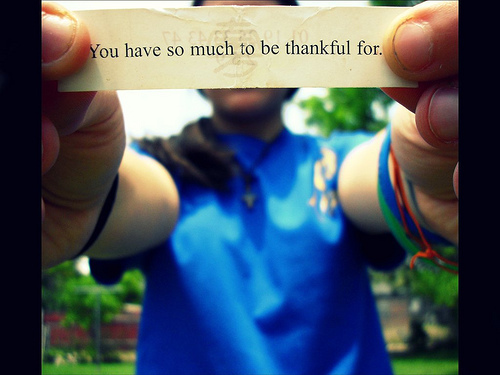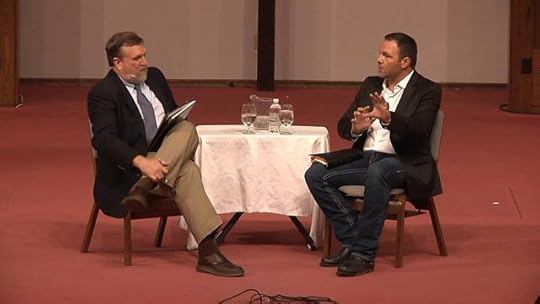Randy Alcorn's Blog, page 200
March 25, 2013
What Happened to Hospitality?
What happened to hospitality? We are a young couple who hosts a small group in our home, and many other gatherings of young families. But it seems like no one ever wants other people in their homes these days. Why is that?
In this video and the following transcript, I share some thoughts.
There are a lot of reasons for this. One is that people are very busy. Another reason is that we have an inflated sense of privacy compared to what other people in other cultures feel. Certainly, people are self-conscious. They don’t have time to clean up, or they think everybody else’s house is clean and theirs isn’t. (Of course, that’s a myth. The only reason they think that is because when other people know they’re coming over, they clean up before their guests arrive.)
 I think some of it is a failure to understand the value of opening our homes to others. Beyond the service and the feeding of the meal, there’s something wonderful about the conversations that can come out of having people over. Some of the greatest discussions are centered around meals. We were at our neighbor’s house not long ago and had a meal together, which was the excuse for us to get together. It was good food, but it was so much more than that because we were able to talk and laugh and had a great time.
I think some of it is a failure to understand the value of opening our homes to others. Beyond the service and the feeding of the meal, there’s something wonderful about the conversations that can come out of having people over. Some of the greatest discussions are centered around meals. We were at our neighbor’s house not long ago and had a meal together, which was the excuse for us to get together. It was good food, but it was so much more than that because we were able to talk and laugh and had a great time.
Also, another thing to remember is that hospitality is a ministry. It recently allowed us to spend time with a couple at dinner and talk about one of their family members who had died. If we just walked up to them at church and asked, “How are you doing since your family member died?” it wouldn’t quite work the same. But in the context of the meal and the leisureliness of time spent together, it worked.
Look up the word hospitality in a concordance and you’ll find it is something that is talked about in the New Testament. We’re supposed to be hospitable, because it’s characteristic of Christlikeness. Also, it’s something that church leaders are supposed to model by opening up their homes.
There are always good things associated with hospitality, including getting families together. (I can’t think of any bad things!) I’m all in favor of it.

Related Resources
Book: TouchPoints: Heaven
Blog: Who Are You Roped to for the Climb?
Resource: Headed Home
March 22, 2013
The Sentence Against God
 In If God Is Good, I share a story that John Stott tells in his book The Cross of Christ about billions of people seated on a great plain before God’s throne. Most shrank back, while some crowded to the front, raising angry voices.
In If God Is Good, I share a story that John Stott tells in his book The Cross of Christ about billions of people seated on a great plain before God’s throne. Most shrank back, while some crowded to the front, raising angry voices.
“Can God judge us? How can He know about suffering?” snapped one woman, ripping a sleeve to reveal a tattooed number from a Nazi concentration camp. “We endured terror... beatings... torture... death!”
Other sufferers expressed their complaints against God for the evil and suffering he had permitted. What did God know of weeping, hunger, and hatred? God leads a sheltered life in Heaven, they said.
Someone from Hiroshima, people born deformed, others murdered, each sent forward a leader. They concluded that before God could judge them, he should be sentenced to live on Earth as a man to endure the suffering they had endured. Then they pronounced a sentence:
Let him be born a Jew. Let the legitimacy of his birth be doubted. Let his close friends betray him. Let him face false charges. Let a prejudiced jury try him and a cowardly judge convict him. Let him be tortured. Let him be utterly alone. Then, bloody and forsaken, let him die.
The room grew silent after the sentence against God had been pronounced. No one moved, and a weight fell on each face.
For suddenly, all knew that God already had served his sentence.
Some people can’t believe God would create a world in which people would suffer so much. Isn’t it more remarkable that God would create a world in which no one would suffer more than he?
God’s Son bore no guilt of his own; he bore ours. In his love for us, God self-imposed the sentence of death on our behalf. One thing we must never say about God—that he doesn’t understand what it means to be abandoned utterly, suffer terribly, and die miserably.
That God did this willingly, with ancient premeditation, is all the more remarkable. Jesus said, “I lay down my life for the sheep.... No one takes it from me, but I lay it down of my own accord” (John 10:15,

Related Resources
Book: If God Is Good
Blog: God's Limitless Love
Video: Why is there suffering in the world today?
March 20, 2013
Distractions, Obsessions, and Kingdom Work
In this three-minute video, I answer the question “How can we guard against a hobby becoming an obsession or something that distracts us from pursuing kingdom work?”
I think what we’ve got to do is look at everything in our lives and ask, “Is this under the lordship of Christ?” Christ is to be Lord of my whole life—including my house, car, hobbies, television-watching, and whatever role sports may have in my life.
In 1 Corinthians 10:31 we’re told, “Whether you eat or drink or whatever you do, do it all for the glory of God.” So with anything in my life, I have to say, “Can I do this to God’s glory?” and also “Am I actually doing this to God’s glory?”
 Whether it’s fantasy football or quilting, whether it’s Facebooking or email or movie-watching—whatever it is—is this thing an instrument or a tool of God in my life that’s bringing about some good things like rest, recreation, and intellectual stimulation? Or is this thing a bad thing that is distracting me from kingdom priorities? Instead of doing this, could I be developing a relationship with my neighbor, helping someone who’s in need, spending time in God’s Word, reading a great book, or talking with my children?
Whether it’s fantasy football or quilting, whether it’s Facebooking or email or movie-watching—whatever it is—is this thing an instrument or a tool of God in my life that’s bringing about some good things like rest, recreation, and intellectual stimulation? Or is this thing a bad thing that is distracting me from kingdom priorities? Instead of doing this, could I be developing a relationship with my neighbor, helping someone who’s in need, spending time in God’s Word, reading a great book, or talking with my children?
So it’s not about legalism or a hard and fast rule that says, “You must do this or you must do that.” But it is about weighing and evaluating and finding a balance in our lives. We should recognize that all things (or nearly all things) can be used to the glory of God, but we must be willing to ask ourselves, “Is this thing in sufficient balance with everything else that I could and should be doing? Or has it gotten out of balance and become an idol—something that’s consuming my attention in ways that it shouldn’t?”
I think one of the ways to test this is by asking ourselves, “Does my mind go there all the time when it’s free to go where it wants to?” So, for example, if it’s your fantasy football team you’re thinking about all the time and not Jesus, it’s probably a good indication that fantasy football has too much of a role in your life. If fantasy football is in balance in the larger scheme of things, and is not interfering with the lordship of Christ, then by all means it could be something that God is honored and glorified in.

Related Resources
Book: We Shall See God
Blog: Living Life or Documenting Insignificance?
Resource: Stewarding Your Time
March 18, 2013
The Least of These: Abused Women
Violence against women is one of the most widespread of human rights abuses. One out of every three women worldwide will be physically, sexually or otherwise abused during her lifetime. During times of war and conflict, sexual violence is used to terrorize and humiliate women and girls. Survivors often suffer further victimization by family and society. [1]
 Perhaps when you read that quote, you think mostly of women in places such as parts of Africa who suffer at the hands of terrorists and guerrillas. And while we can and should intervene and care for them, we must remember that it’s not only women in faraway parts of the world who are affected by abuse, and especially domestic abuse. It’s the woman next door; the woman out jogging; the woman you see at the supermarket, the department store, and even at church.
Perhaps when you read that quote, you think mostly of women in places such as parts of Africa who suffer at the hands of terrorists and guerrillas. And while we can and should intervene and care for them, we must remember that it’s not only women in faraway parts of the world who are affected by abuse, and especially domestic abuse. It’s the woman next door; the woman out jogging; the woman you see at the supermarket, the department store, and even at church.
As the father of two precious grown daughters (who are married to godly men), I can only imagine how I would feel if either of them were to be abused. How does God the Father feel about abuse toward women?
The Lord examines the righteous,
but the wicked, those who love violence,
he hates with a passion. (Psalm 11:5)
O Lord, you hear the desire of the afflicted;
you will strengthen their heart; you will incline your ear
to do justice to the fatherless and the oppressed,
so that man who is of the earth may strike terror no more. (Psalm 10:17-18)
I know that the term “abuse” is sometimes overused and applied too loosely. But other times it is exactly the right word.
First, my thanks to EPM’s Julia Stager for compiling much of the information in this blog, and also to Stephanie Anderson for help in editing. Second, below is an article based on Catherine Kroeger and Nancy Nason-Clark's book No Place for Abuse: Biblical and Practical Resources to Counteract Domestic Violence.
Give Abused Women the Help They Need
Women from every walk of life are suffering abuse throughout the world today at the hands of men they love—so much so, that domestic violence is a leading cause of death and disability among women. Often, these hurting women seek help from the people who should care the most about freeing them from their oppression: Christians. But too many Christians fail to help abused women, letting the evil of abuse continue in many homes where men proclaim faith in Christ yet ignore His commands to truly love the women close to them.
Don't ignore the abuse that women you know—even women at your church—are going through, no matter how uncomfortable it may make you. Choose to become part of the solution by answering God's call to give abused women the help they need. Here's how:
Ask God to open your eyes to prevalence and severity of the problem. Pray for the ability to notice women around you who are suffering from physical, sexual, emotional, or verbal abuse, and to feel compassion for the women and also for the hurting men who are inflicting their pain on the women they abuse. Seek to understand some of the common reasons why women struggle to break free of abusive relationships, such as fear of what men might do if they leave, hope that the men will change their abusive behavior, and the economic dependence of some women on men. Realize that domestic violence is a complex and serious problem that affects many couples—including many Christian ones—who desperately need people willing to minister to them with God's love. Keep in mind that the home is no place for abuse, and the church is no place for silence, so don't turn away whenever you encounter the reality of abuse taking place in the lives of women you know.
Increase awareness in your church. Use means such as sermon illustrations, information packets, posters, and training materials to inform your congregation about domestic violence and urge them to be alert to it among people in their own community.
Condemn abusive behavior. Speak out against domestic violence whenever you have an opportunity to do so, making it clear that God does not condone abusive behavior in any circumstances.
Educate people. Teach people how to deal with their disappointments and frustrations in nonviolent ways when they gather for adult Bible studies or Sunday school classes, or during youth group meetings. When engaged couples go through their premarital counseling at your church, help them learn how to resolve conflicts in healthy ways and understand that authority in the home is meant for loving servant leadership rather than controlling and dominating another person. Train church staff and volunteers how to recognize signs that people may be suffering abuse, as well as how to reach out to those people in practical and effective ways. In sermons, discuss the importance of respecting other people and working to build and maintain peaceful relationships.
Provide safe places for people to talk. Give the people who attend your church plenty of opportunities to talk honestly with others about the problems they're struggling with—including abusive relationships. Train people who participate in small groups and prayer events to listen carefully to people without judging them, and to respect people's confidentiality. Whether your church is ministering to abused women or to the men who abuse them, offer respite from turmoil and the encouragement and support they need to pursue healing.
More Information and Statistics
30% of Americans say they know a woman who has been physically abused by her husband or boyfriend in the past year. [2]
Every 9 seconds in the US a woman is assaulted or beaten. [3]
1.3 million women are victims of physical assault by an intimate partner each year. [4]
Only approximately one-quarter of all physical assaults, one-fifth of all rapes, and one-half of all stalkings perpetuated against females by intimate partners are reported to police. [5]
How to Recognize Abusive Relationships
Signs of Domestic Violence [6]
Physical Abuse
Emotional Abuse
Social Abuse & Isolation
Psychological & Mental abuse
Sexual Abuse
Economic Abuse
Jealousy
Intimidation, Coercion & Threats
Minimizing, Denying & Blaming
Using Children
Unequal Rights &/ Privileges
Spiritual Abuse
Emotional Abuse Tactics
Name Calling
Criticism & Put-downs
Yelling & Swearing
Sulking
Insulting you, your friends/family
Manipulation
Mind-games
Lying
Accusations
Jealousy
Mirroring (counter accusing)
If you think you might be in an abusive relationship, please seek help from a trusted Christian friend and/or pastor, and contact a local church to help you find further resources and trusted organizations in your area.
How Can You Get Involved and Help an Abused Woman?
 Understand the complexity of abuse and realize that help and healing is a long journey. You cannot "rescue" her. She has to want to get help.
Understand the complexity of abuse and realize that help and healing is a long journey. You cannot "rescue" her. She has to want to get help.
Help her develop a safety plan.
Find a local support group (Christian, if possible); offer to accompany her.
Locate a safe place for her and her family if she's in a dire situation (when she separates, she's most vulnerable to violence).
Support a group like Hagar's Sisters (www.hagarssisters.org) or any other local group by volunteering or donating.
Recommended Reading
True Grit by Deborah Meroff
Refuge From Abuse, Healing and Hope for Abused Christian Women by Nancy Nason-Clark and Catherine Clark Kroeger
Keeping the Faith: Guidance for Christian Woman Facing Abuse by Marie Fortune
Why Does He Do That? by Lundy Bancroft
The LORD is a stronghold for the oppressed, a stronghold in times of trouble. (Psalm 9:9)

Related Resources
Book: Help for Women Under Stress
Blog: The Least of These: Those without Clean Water
Resource article: Sexual Abuse Can Be an Obstacle to Salvation
Sources
[1] http://www.rescue.org/our-work/gender...
[2] (Allstate Foundation National Poll on Domestic Violence, 2006. Lieberman Research Inc., Tracking Survey conducted for The Advertising Council and the Family Violence Prevention Fund, July – October 1996) http://www.dvrc-or.org/domestic/viole...
[3] http://domesticviolencestatistics.org...
[4] Costs of Intimate Partner Violence Against Women in the United States. 2003. Centers for Disease Control and Prevention, National Centers for Injury Prevention and Control. Atlanta, GA
[5] Tjaden, Patricia & Thoennes, Nancy. National Institute of Justice and the Centers of Disease Control and Prevention, “Extent, Nature and Consequences of Intimate Partner Violence: Findings from the National Violence Against Women Survey,” (2000).[6]http://safe-at-last.hubpages.com/hub/...#
Photo credits
Eye close up: vierdrie via sxc.hu | Woman smiling: evemex via sxc.hu
March 15, 2013
Som Sabadell Flash Mob and the Gift of Music
 I love the transcendence of great music. God, the Creator of Music, gifts His image bearers to praise Him, some knowing Him, some not. But my heart is moved to praise as I listen to the music in this video and watch the faces. Thank You, Lord, for one more way you manifest your goodness and happiness in this fallen world.
I love the transcendence of great music. God, the Creator of Music, gifts His image bearers to praise Him, some knowing Him, some not. But my heart is moved to praise as I listen to the music in this video and watch the faces. Thank You, Lord, for one more way you manifest your goodness and happiness in this fallen world.

Related Resources
Book: Heaven
Blog: Creator and Culture, and Anticipating a Redeemed Earth
Audio: How is music a part of your writing process?
Photo credit: porah via sxc.hu
March 13, 2013
Help for Women Under Stress: now available exclusively from EPM
 It’s been twenty-eight years since I originally wrote Women Under Stress with my wife Nanci, and it’s been out of print for nearly twenty. When the book originally came out I had only one book in print, and it had sold maybe 10,000 copies. Women Under Stress went out of print before any of my books made the bestsellers list. By God’s grace over seven million copies of my books are now in print. Hence, relatively few people who have read my later books have read this one.
It’s been twenty-eight years since I originally wrote Women Under Stress with my wife Nanci, and it’s been out of print for nearly twenty. When the book originally came out I had only one book in print, and it had sold maybe 10,000 copies. Women Under Stress went out of print before any of my books made the bestsellers list. By God’s grace over seven million copies of my books are now in print. Hence, relatively few people who have read my later books have read this one.
Why a book on stress for women? While men and women have common stressors, there are significant differences between how and why they experience stress. Most of the research on stress has been done on men. Nevertheless, stress is chronic among women and, in our experience, it’s most often women who cry out for help.
When people asked how a man could possibly write about women and stress, I pointed out that I was the author of many years of stress for my mother. Nanci would no doubt vouch for the stress I’ve brought into her life. And by the time they were teenagers I’m sure my beloved daughters Karina and Angela would say I had put them under stress (especially when I insisted on going through a sixteen-page handout with each boy they dated). So I do have some credentials when it comes to women and stress!
Since this book has been unavailable for twenty years, and yet most of it is as relevant as when it first came out, it seemed time for a resurrection, and a thorough update and revision. We’re republishing this because—not surprisingly—women are still under stress! And perhaps, in our ever-changing, media-saturated, fast-paced world, they’re under more stress than ever.
Nanci helped me a great deal with the original book’s research and we talked through every chapter. The writing fell to me. I see now how my writing style has changed over the years, hopefully for the better! I was glad to do what I could to improve the book.
Learn more about Help for Women Under Stress in this 2-minute video:
 As I share in the first chapter, Nanci and I wrote this book after experiencing a fair amount of stress ourselves. Since then, we’ve faced a great deal more stress—including disease and surgeries, lawsuits and job loss—but also more joys from the hands of our God of grace and providence. Now more than ever, we can say: “In my distress I called upon the LORD; to my God I cried for help. From his temple he heard my voice, and my cry to him reached his ears” (Psalm 18:6).
As I share in the first chapter, Nanci and I wrote this book after experiencing a fair amount of stress ourselves. Since then, we’ve faced a great deal more stress—including disease and surgeries, lawsuits and job loss—but also more joys from the hands of our God of grace and providence. Now more than ever, we can say: “In my distress I called upon the LORD; to my God I cried for help. From his temple he heard my voice, and my cry to him reached his ears” (Psalm 18:6).
We hope this new release of Help For Women Under Stress will provide a deeper understanding of how stress impacts your life—and how God uses stress to draw us to himself and to encourage us to make necessary changes. (As the thirsty seek water, those under stress often seek God.)
If you’d like to read an excerpt, you can download chapter 2 from the book ("Stress: What's It All About?") and take the stress quiz to find out how stress is affecting your life.

Related Resources
Book: Help for Women Under Stress
Blog: Trillia Newbell on Femininity, Motherhood, and God’s Word
Article: Circumstances or Perspective?
From Eternal Perspective Ministries
Stress. It’s part of our everyday lives, sometimes as the spark that keeps us moving forward and sometimes as the avalanche that threatens to bury us. Chances are, since this book’s title has caught your eye, you are looking for some relief from stress, or at least hope that relief is possible.
In this thoroughly revised and updated edition of Help for Women Under Stress originally published in 1986, Randy and Nanci offer you both the hope and the help you are looking for. They not only help you understand what stress is and how it operates, but give plenty of useful tips and strategies for bringing peace to the chaos of your daily life.
Your energy is perishable, but can be daily replenished. Don’t waste your life in unnecessary and unwise responses to stress. Let this book help you live in a way that honors God and your loved ones, while understanding and respecting your limits.
Available exclusively from EPMpaperback $9.99 (retail $14.99)
ebook $3.99 (retail $6.99)
kindle | nook | kobo | ipad | pdf
March 11, 2013
The Cross of Christ: A Symbol Not of Our Worthiness, But Our Unworthiness
 Years ago I spoke at a Christian event where the vocalist got up to sing one of my favorite songs, “Amazing Grace.” But I was taken aback when I heard the first line:
Years ago I spoke at a Christian event where the vocalist got up to sing one of my favorite songs, “Amazing Grace.” But I was taken aback when I heard the first line:
“Amazing Grace, how sweet the sound, that saved a soul like me.”
Notice the revision? The word “soul” was substituted for the writer’s word “wretch.” Why? The word “soul” was more psychologically correct. To use the word “wretch” is considered by some to be demeaning to human beings. I couldn’t help but think of John Newton, writer of the song. He was an immoral slave-trader and blasphemer, a man who knew he was a wretch, who had wept over the depth of his sins. Only because he understood that fact so profoundly, could he then understand why God’s grace to him was so utterly amazing.
If we were just morally neutral “souls,” or lovely worthy souls (which is the theology of self-esteem), then there was nothing amazing about God’s grace. And that’s the problem. When we elevate ourselves and our worthiness, we denigrate and undermine the wonder of God’s grace toward us.
An example of our easily skewed thinking is the way that Christ’s death on our behalf is now routinely used as a proof of our worthiness. How do we reassure ourselves that we are really worthwhile people? “Christ died for us, and look at the price he paid!” We were worth dying for, right?
The amazing truth is that Christ died for utterly unworthy people (Rom. 5:7-8). To minimize our unworthiness by emphasizing our value is to minimize the redemptive work of Christ on our behalf. The fact that Christ died for us is never given in Scripture as a proof of our value as wonderful people, but a demonstration of his unfathomable love. So unfathomable that he would die for rotten people, “wretches” like you and me.
 The cross of Christ is a demonstration of God’s utter goodness and grace, and our utter depravity and unworthiness. Indeed, the idea that God died for morally good or morally neutral “souls” is a heresy of the worst kind. It is “psychologically correct” (that is, popularly believed in psychological circles) but it is theologically as incorrect as it could possibly be.
The cross of Christ is a demonstration of God’s utter goodness and grace, and our utter depravity and unworthiness. Indeed, the idea that God died for morally good or morally neutral “souls” is a heresy of the worst kind. It is “psychologically correct” (that is, popularly believed in psychological circles) but it is theologically as incorrect as it could possibly be.
Suppose a man murdered five children and his bail was set at ten million dollars. (Hopefully no bail would be set, but go with me for the illustration’s sake). Would you look at the enormity of the price of his freedom and conclude, “Wow, this man must really be worthy! I mean, his value is set at ten million dollars!”? I doubt his lawyer or anyone else would point to the cost of his bail as an indication of his worth or a basis for his self-esteem.
Yet that’s exactly what we do when we say “we must be worthy—look at the price that had to be paid for our redemption.” No, the astronomical price of our redemption—the shed blood of God—is a testimony not to how good we are, but to how bad we really are! If we hadn’t been so bad, a lower price would have been sufficient. The higher the price, the greater testimony to our depravity, and the wondrous love of God. The cross of Christ should make us feel worse about ourselves, and better about God!
Now, of course, because of God’s grace, there is much for us to be happy about! We can feel good about what God has done for us and to us and in us. We can be delivered from sin and guilt and shame. And in that sense, we can and should feel better about our redeemed, blood-covered and Heaven-bound selves.
We need not worry about ceasing to deserve God’s grace because we never deserved it in the first place! We don’t have to fear becoming unworthy of him precisely because we were never worthy of Him! We are forever secure in the love of Christ, as we could never be if our relationship with Him depended upon our worth. Yes, he loves and cherishes us, but in a way that fully credits Him, not us.
It’s not only for God’s glory but for our good that we understand the cross of Christ doesn’t show our worth, but God’s.
“For if, when we were God’s enemies, we were reconciled to him through the death of his Son, how much more, having been reconciled, shall we be saved through his life! Not only is this so, but we also rejoice in God through our Lord Jesus Christ, through whom we have now received reconciliation” (Romans 5:10-11).

Related Resources
Book: The Grace and Truth Paradox
Blog: A Look at the Song "Amazing Grace"
Article: Self-Esteem: Who Are We, Really?
Hymn book photo credit: kalebdf via photopin cc
Cross photo credit: jonvoights_toe via photopin cc
March 8, 2013
Gratitude: God’s Will for Us
In this 3 minute video and the following transcript, I share some thoughts about gratitude.
1 Thessalonians 5 says, “Be joyful always. Pray continually. Give thanks in all circumstances for this is God’s will for you in Christ Jesus.” Sometimes we search for the will of God. We wonder if it’s God’s will for me to go to this school, have a relationship with this person, move to this apartment, apply for this job, or whatever it is.
 But in several places, Scripture tells us exactly what God’s will is. Here’s one of those places: it is God’s will that you give thanks in all circumstances—thanksgiving, gratitude, an expression of our hearts praising God for His goodness and how He has provided for and taken care of us. This is something that is built into what it means to be a follower of Christ.
But in several places, Scripture tells us exactly what God’s will is. Here’s one of those places: it is God’s will that you give thanks in all circumstances—thanksgiving, gratitude, an expression of our hearts praising God for His goodness and how He has provided for and taken care of us. This is something that is built into what it means to be a follower of Christ.
People who learn to say “thanks” become more thankful. It’s a great thing to cultivate in a child by teaching them to say “thank you” for things. Maybe they’re not feeling all that grateful at the time. But the habit of expressing and saying “thank you” makes a more thankful person.
We live in a culture where there is a spirit of entitlement—where we think we deserve all of these great things. If something doesn’t go our way, we feel like we’ve been robbed and deprived. When a person gets what they think they’re already entitled to, they’re not grateful for it. After all, “I deserved it!” And when they don’t get what they think they deserve, there’s the spirit of ingratitude.
This is where we as Christians need to focus on what Christ has done for us and the promises of Scripture. Romans 8:28 says, “And we know that in all things God works for the good of those who love him, who have been called according to his purpose.” God has promised us—guaranteed us with a blood-bought promise, the shed blood of the Son of God—that He will in the end use for good even the hardest things that have ever happened to us.
That’s why I think Scripture can tell us, “Be joyful always. Give thanks in all circumstances.” We may not know why something difficult is happening now. One day we will, and we’ll see how God used it in our lives for His glory and for our ultimate good.

Related Resources
Book: 90 Days of God's Goodness
Blog: Sustained through Gratitude
Article: Long, Habitual, and Uninterrupted Mercies
photo credit: Sadie Hernandez via photopin cc
March 6, 2013
The Authority of Scripture and the Supernatural Leading of the Holy Spirit
 A Conversation between Two Reformed Pastors
A Conversation between Two Reformed Pastors
I enjoyed this dialogue between Doug Wilson and Mark Driscoll, two controversial pastors who I happen to appreciate. Please, rather than commenting about why you don’t like either of them, just listen to what they’re saying here and judge it on its own merit. THEN I welcome your comments. :)
I think you’ll find it interesting regarding the question of how we can hold to the authority of the Scriptures while recognizing the miraculous leading of the Holy Spirit. Can Charismatics and Calvinists be harmonized? Don’t let the title throw you—it’s a good and entertaining interaction.
Doug Wilson Interviews Mark Driscoll | Part II - Spiritual Gifts & Cessationism from Canon Wired on Vimeo.

Related Resources
Blog: "You Are in Danger": Mark Driscoll Preaches on Hell
Video: How God Uses Evil for Good: A conversation with Mark Driscoll
March 4, 2013
Save Saeed
 Some of you have followed the story of the Iranian pastor Saeed Abedini. I’ve included a video in this post in which his wife Naghmeh speaks of her husband’s eight year sentence to a horrific prison. Saeed was in Iran helping with an orphanage when he was arrested for sharing his faith in Christ. His wife is still struggling with how much she should tell the children about what their father is going through.
Some of you have followed the story of the Iranian pastor Saeed Abedini. I’ve included a video in this post in which his wife Naghmeh speaks of her husband’s eight year sentence to a horrific prison. Saeed was in Iran helping with an orphanage when he was arrested for sharing his faith in Christ. His wife is still struggling with how much she should tell the children about what their father is going through.
Every day an estimated 200 million Christ-followers suffer across our globe. Hebrews 11:35-38 recounts stories about God’s suffering children. It says,
Some were tortured, refusing to accept release, so that they might rise again to a better life. Others suffered mocking and flogging, and even chains and imprisonment. They were stoned, they were sawn in two, they were killed with the sword. They went about in skins of sheep and goats, destitute, afflicted, mistreated— of whom the world was not worthy…
I have always loved those words, “of whom the world was not worthy.”
If you wish to sign a petition pleading for Saeed’s release, go to the ACLJ site.
If you want to be informed about how you can pray for and help people around the world who are suffering for Christ, see Voice of the Martyrs. I encourage you to consider supporting Voice of the Martyrs as we do at EPM. (Another ministry to check out is The International Justice Mission.)
Please watch this video from www.savesaeed.org and let God touch your heart through it.

Related Resources
Book: Safely Home
Blog: Remember Us and Pray for Us: the Persecuted Church
Audio Message: Those of Whom the World Is Not Worthy






